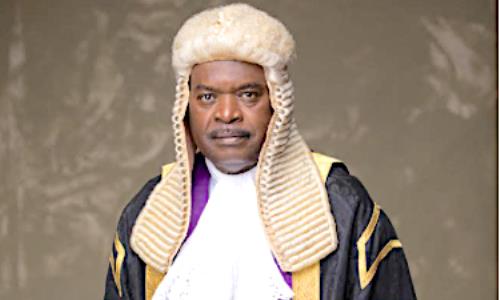Headlines
President Buhari’s nominee to ICC, Justice Ishaq Bello, rated low
A panel that looked into the competence of candidates to serve on the court rated him at the bottom of 20 judges being considered for the role, according to a report of the panel obtained by the Gazette

A team of legal experts at the International Criminal Court (ICC) has rated President Muhammadu Buhari’s nominee to the court, Justice Ishaq Bello, low, according to a report published Friday by Peoples Gazette.
Bello is the Chief Judge of the Federal Capital Territory, Abuja. He was nominated by President Buhari in June as the Nigerian candidate to the Netherlands-based ICC.
A panel that looked into the competence of candidates to serve on the court rated him at the bottom of 20 judges being considered for the role, according to a report of the panel obtained by the Gazette.
The committee had in September outlined its criteria to determine the suitability of 20 nominees, out of which six judges will be elected at the Nineteenth Session of the Assembly in December.
The advisory panel listed the parameters for becoming a judge of the ICC as follows:
- Highly qualified: the candidate excels in terms of the experience and knowledge about the Court and its jurisprudence; it is very likely that he/she would be able to make an important contribution to the work of the Court.
- Qualified: the candidate has some relevant experience and knowledge about the Court; he/she could contribute to the work of the Court.
- Only formally qualified: the candidate meets the requirements set out in the Rome Statute for election as a judge, but it is uncertain if the candidate could make a noteworthy contribution to the work of the Court.
- Not qualified: the candidate does not meet the formal requirements set out in the Rome Statute.
In its assessment of the nominees, the committee described Nigeria’s candidate Justice Bello as having “a very limited knowledge” of the workings of the ICC, hence is only formally qualified for appointment as judge of the Court.
“The Committee noted that, based on his answers to questions particularly regarding participation by victims and the functions of the Pre-Trial Chamber (but also other areas), the candidate appeared notably to have a very limited knowledge of the Rome Statute, the practices and procedures of the Court and its jurisprudence.
“Based on both his professional experience as well as his answers during the interview, and bearing in mind particularly his lack of detailed knowledge of the workings of the Court, the Committee concluded that the candidate was only formally qualified for appointment as judge of the International Criminal Court,” the committee’s report seen by the Gazette read.
The report, however, highlighted Bello’s extensive judicial experience in criminal proceedings, as well as his articulate and knowledgeable stance regarding criminal law and procedure at the national level.
READ: President Buhari’s INEC Commissioner nominee is an APC member
Meanwhile, a candidate from Sierra Leone, Maria Matta Samba, was described as “highly qualified” for appointment as judge of the ICC by the advisory panel.
Samba was deemed to have extensive and wide-ranging national judicial experience, “while demonstrating throughout the interview, her in-depth knowledge of the Rome Statute system and the jurisprudence of the International Criminal Court.”
Justice Bello has been at the high court in Abuja for more than two decades, but it was his 2017 controversial ruling in the 2005 extra-judicial murder of six auto spare parts traders, the “Apo Six”, that shut him into national infamy.
The FCT chief judge had sentenced two of the six accused police officers accused in the murder to death, while three others, including a senior police officer, Danjuma Ibrahim, who reportedly ordered the shooting of the unarmed citizens, were controversially discharged and acquitted.
The citizens, Ekene Mgbe, Ifeanyi Ozor, Chinedu Meniru, Paulinus Ogbonna, Anthony Nwokike and Augustina Arebu were killed on June 8, 2005. They were understood to be returning from a night club when they were stopped at a police checkpoint.
After killing them, the police officers tagged them as members of an armed robbery gang who had purportedly “opened fire on the officers” when stopped. The police also reportedly planted weapons on the victims to cast them in public as armed robbers.
A judicial panel of inquiry set up by former President Olusegun Obasanjo rubbished the claim and recommended the trial of the six officers.
After twelve years, Bello finally ruled on the case. He convicted Ezekiel Acheneje and Emmanuel Baba, both of police rank-and-file.
However, the controversial judge acquitted Ibrahim and two other officers for want of evidence, ignoring confessional statements of the convicted officers that they shot the traders based on superior directive from Ibrahim.
Ibrahim’s acquittal was widely condemned by Nigerians but he was nonetheless promoted as an assistant inspector-general of police following the court case.
Despite concerted plea from the victims’ families, who have lived in agony since the 2005 tragedy, the attorney-general Abubakar Malami also declined to appeal the ruling, leaving Ibrahim a free man.
Justice Bello also drew criticism last year when he said families of serving judges could replace them on the bench, a decision, critics said effectively elevated nepotism into a state policy.
In March 2018, Nigeria received worldwide accolades when Chile Eboe-Osuji became the president of the ICC. Justice Eboe-Osuji became a judge at the court in 2012.
